Don't wanna be here? Send us removal request.
Text
tbf there is a Sami place in game and it's a cool place with cool people.
I really don't think the developers hate the native people there.
Also all people are animals. Pure humans don't exist in game.
I really wish arknights didn't have a character who's named for an ethnic slur of my people
13K notes
·
View notes
Text

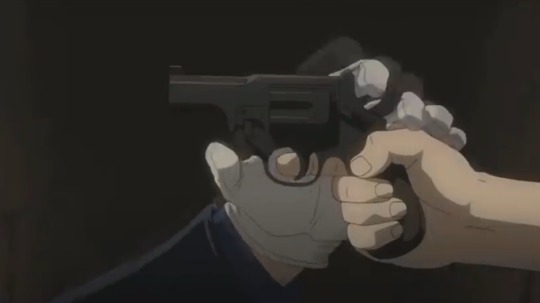
Ok so maybe I’m reading too far into this, but, the first rule of using any kind of gun is that the finger only goes over the trigger when a person intends to shoot. I’ve had it drilled into me that even while aiming a gun my index finger goes on the space above the trigger. Absolutely, under no circumstances, does a person put their finger on the trigger until they’re ready to pull it.
Which means in this scene, Riza completely intends to shoot Roy. She didn’t put up and aim her gun for show. She’s about to pull the trigger and kill him.
4K notes
·
View notes
Text
Gang leader Ash
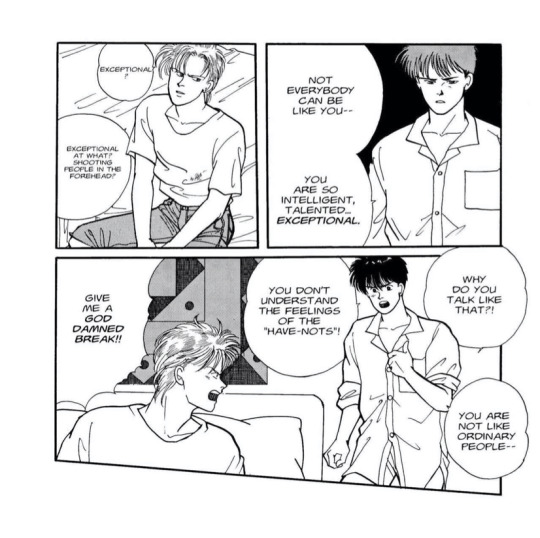
I think what Eiji means by “exceptional” here is the same as the reason why Arthur hates Ash. Let’s unpack this.
Of course, I know nothing about how gang mentality works. From what I see in Banana Fish, I assume that in the world of gangs the laws of nature apply and one is relatively stripped from one’s own free will. Ash must have found himself in this world around the time he went to juvie. I think other kids who got influenced by his intelligence, charisma and fighting skills kind of stuck close to him to ensure their own safety by siding with the strong. And that’s how Ash became their leader. So just like how these kids chose Ash as their boss to guarantee their survival, Ash’s survival depends on how good a boss he is to his gang members. That means there is a very fine line between becoming a gang leader and being chosen a gang leader. Judging from the following two scenes, it’s not really up to whether the said gang leader wants to be boss or not.
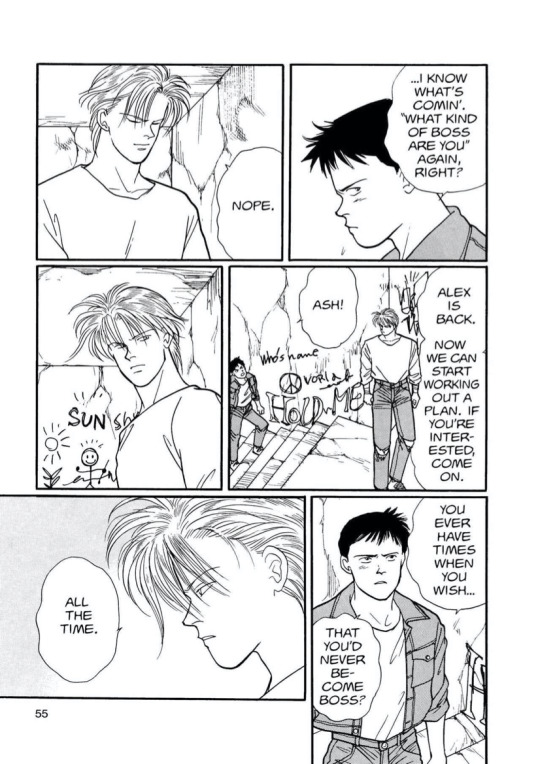
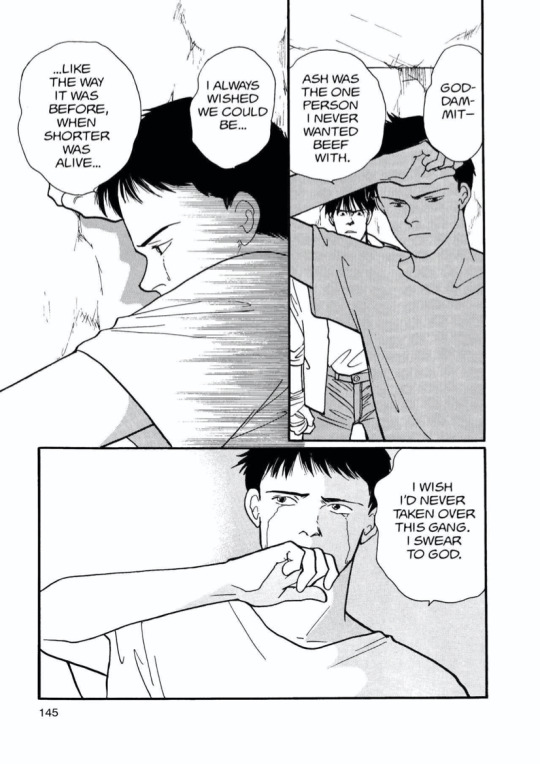
Then there are scumbags like Frederick Arthur who will do whatever it takes to become boss without being chosen as one. Arthur can see that Ash with his natural leadership abilities has the potential to become the king of the underworld (just like Golzine wants him to be) and he wants so badly to be in his place. So he plays dirty to thwart him at every chance. Arthur can also see that Ash has no desire to rule the underworld. Ash doesn’t want any of the qualities he has that make Arthur green with envy. And this just drives Arthur mad. That’s why he hates Ash with all his guts.
There’s a pattern in Banana Fish in which Ash gets raped, is almost killed and finds himself in a situation where he has to do stuff he doesn’t want to like killing people, all because of the qualities he didn’t want in the first place.
Keep reading
143 notes
·
View notes
Text
Monsters Wearing People Skin: The Effectiveness of Abuse in Banana Fish
For fans of Banana Fish, Ash being the victim of brutal, horrific sexual abuse from the time he was just a little boy is like a shadow that lingers over the fandom.
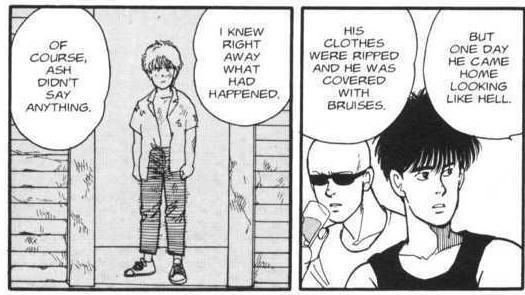
It hangs there, over all events, dulling even the most gentle, or mundane moments around the edges like a cloudy sky that threatens a storm. This abuse darkens the landscape not only of Ash’s past, and his present—but his entire personality. It is that tint of gloom that spills over and blackens whatever fleeting brightness Ash finds himself stepping into for the shortest of times. It is the shadow pinned to his bones, it is the anchor chained to his soul.
Keep reading
841 notes
·
View notes
Text
Similar with Plato, Rousseau is also an advocate for gender inequality, much to my dismay. Justifying his reasonings as the intentions of nature, in his perspective women have the exact role as those living in Muslim countries- they are but vassals to fulfil men’s desire and reproduction of heirs. Rousseau advocates liberty for men and legitimacy of government for men, and only for men. George Klosko starkly highlighted Rousseau’s lack of consistency in his double standard, fortunately, and from this man we should always remind ourselves the painful existence of misogynists, the blatant advocates for maltreatment of our kind.
4 notes
·
View notes
Photo




one thing you generally don’t want to do is start fighting a long war of economic attrition against an economic giant
15 notes
·
View notes
Text
What are conditions like in Russia amidst the war and sanctions? What is the popular reaction to all of this? How does this break down by class and region?
The public mood has changed since the beginning of the war. In its first days, most of the people were very disappointed about it. The society was really divided and confused as there was no consensus built in advance for how people should react to it.
Despite the fact that the mobilizations against the war were not massive, they were visible and had an impact. There were some thousands of people who turned out in protests across the country. But they were harshly repressed.
Now it seems a new consensus of support for the war has developed. That’s what the opinion polls indicate. Of course, you cannot trust them, but it does appear that people in the majority are accepting the propaganda from Putin’s regime. There is still a minority of the population, maybe twenty to thirty percent, who strongly oppose the war.
I think the support for the war is partially rooted in a psychological predisposition to believe in the state’s propaganda. People find themselves in a totally unexpected situation, something that they were not prepared for, so they opt for the most comfortable way of understanding it, which is to accept what the government is saying rather than adopt a radical position of opposition to it.
They also believe the government’s claim that the war will all be over soon, and things will return to normal. This is a reassuring illusion. Who knows how they will react when they realize that nothing will ever be the same again in Russia? […]
The Biden administration is attempting to frame these rivalries as a contest between the so-called democratic West and its authoritarian opponents—Russia and China. It sounds a lot like Samuel Huntington’s argument that this inter-imperial conflict is driven by clash of civilizations. What’s the problem with that framework?
When Samuel Huntington put forth this view, he contended that the divisions between states were not the result of history and politics but expressed essential differences. Some states were democratic by their very nature and others were authoritarian. These were unchanging characteristics.
It is a profoundly reactionary position but one very deeply rooted in Cold War ideology. And it’s now getting a new hearing not just in the U.S. but also in Russia and China, who share an essentialist way of thinking about geopolitical rivalries.
U.S. Cold War thinkers like George F. Kennan argued that the Soviet Union was undemocratic, not because of its political history, but that it was Russian. And Russia was destined to produce an autocracy, regardless of its political regime, whether Tsarist or Communist. They contrasted that with the US’s supposed predisposition to democracy. […]
Finally, let’s turn to the international left. Some sections of it have treated Russia as part of the so-called axis of resistance to US imperialism and justified in its war in Ukraine as defensive. Others reduce the war to an inter-imperial one and deny Ukraine’s right to self-determination and oppose its right to secure arms in self-defense. What’s wrong with these positions? In place of these, what should the international left do and argue amidst this war?
I absolutely don’t understand the argument that Russia is in any kind of way an alternative to the U.S. and the neoliberal order it has superintended. Putin’s regime is profoundly reactionary. Its political objections to the current order are those of Donald Trump in the U.S. Imagine living in a country ruled by Trump for twenty years.
That is no alternative to the global capitalism! Donald Trump was quite critical of globalization, but on nationalist and capitalist grounds, and those are not solution to the problems of anyone anywhere. Putin offers no alternative but authoritarian, imperial nationalism.
The idea that Russia provides an alternative to U.S. imperialism is equally suspect. It might have been possible to argue that the Soviet Union offered an alternative to U.S. dominated capitalism and imperialism. It provided some support for liberation struggles. But that is in the past.
Putin’s Russia today offers no progressive model attractive to any genuine movement for liberation anywhere in the world. It is not attractive for any country in the post-Soviet region. It’s not attractive for the people of Ukraine. And it’s certainly not attractive for people in the U.S. or in Western Europe.
I also disagree with those on the left that reduce the war in Ukraine to just an inter-imperialist conflict between the U.S./NATO and Russia. The main problem is that this concept is based on the denial of the subjectivity and agency of oppressed countries. That’s Putin’s approach. It treats such countries as mere pawns without any interests and capacities of their own in a struggle for liberation.
Moreover, it mimics Putin’s notion that there are only a few true nations with genuine historical legitimacy and real security concerns like the U.S., China, Germany, and Russia. The rest he sees as fake countries. They’re not subjects of history, but objects of history and geopolitics, the tools of someone else. For Putin, these are the Baltic states, Poland, and Ukraine among others.
This way of thinking is exactly the ideology of imperialism at the beginning of Twentieth century. The left must reject such thinking. In the beginning of the Twentieth century, the international left was much clearer about how to combine opposition to all imperialisms with recognition of the right of oppressed nations to self-determination.
They recognized the subjectivity, agency, and right to self-determination of weaker and oppressed nations, even those led by non-socialist forces. They are much more progressive than the so-called security concerns of any imperialist powers. The left really needs to go back and read Lenin’s writings on the national question.
I think the Left needs to return today to an internationalism which has largely been lost today. The international solidarity of the oppressed is incompatible with the pseudo-“anti-imperialist” attitude of “the enemy of my enemy is my friend.” The long-standing justification of Putin by part of the American left, and the repetition of Kremlin propaganda points about the “Nazi” regime in Kiev, has undermined the credibility of many Ukrainian and Russian activists.
87 notes
·
View notes
Text
Repost from How the ‘geopolitical worldview’ among dictators and scholars alike enables the unthinkable in Ukraine
Such reasoning precludes the subjectivity of “regular” nations in relation to “greater powers.” Viewing the world this way treats “powers” like single, uniform entities, as if they were individual people. This kind of thinking cannot accommodate all the life within these countries — all the people with their different beliefs, faiths, disagreements, plans, and dramas. This worldview is blind to that diversity, seeing only an imaginary monolith of economic and cultural activity. This substitution is tangible even at the linguistic level. Look at any geopolitical insight and you’ll read about how countries ��decide,” “want,” “suffer,” “are humiliated,” “are outraged,” and “call for.” But a state can’t do any of these things — only living, breathing people can. Any “national decision,” moreover, has many opponents within that very nation.
First, the disappearance of all living things happens in theory, in the process of unpacking or discussing the next grand geostrategic idea. For most people who think in terms of “world orders” and “great power politics,” however, this erasure of life takes hold and shapes future ideas. Those who embrace this worldview only impoverish themselves; they’re stuck talking about rearranging lifeless entities or studying them for academic degrees. The real disaster comes when this “science” is applied — when geopolitics becomes the only language spoken by those who wield power. When this happens, war begins.
The world’s dehumanization is no longer a theoretical exercise but something unfolding in reality. Applied geopolitics sweeps away any concept of living people, their deeds, and views, it destroys their homes, spares no values other than survival, and makes power extreme and regimes and state borders sacred. This breed of politics forces people to die for lines on the map and shed blood for dirt. Applied geopolitics replaces a productive economy with the mobilization of any resources that can be grabbed for war, regardless of people’s rights to life, freedom, and property.
At an official level, Russia ignores the casualties among its own military and civilians because a struggle waged between faceless entities — between national powers — doesn’t have to acknowledge the deaths of “ordinary” people. After all, both the actors and the victims here are powers, not people. This is how the dehumanization of the world works.
While I do not agree with its despise on Geopolitics, namely the theory to understand international relations by geographical proximity, its sound reminder on not to neglect humans in countries as having individual thoughts are very sound.
0 notes
Text
Gazprombank's vice-president Igor Volobuev left Russia for Ukraine and is preparing to join Ukraine's Territorial Defense Forces.
[...] "I couldn't remain in Russia any longer. I'm Ukrainian by nationality, I was born in Akhtyrka [near Sumy]. I couldn't watch what Russia is doing to my motherland from the sidelines any longer. My trip is like a repentance, I'd like to wash myself clean of my Russian past. I'd like to stay in Ukraine until victory," Volobuev said.
[...] He also commented on the deaths of Gazprombank's former vice-president Vladislav Avaev and his family. Based on information from Russia's Investigative Committee, media had reported that the top manager killed his wife and child and then took his own life. According to Volobuev, it was a staged suicide.
[...]"I don't know what he did, I never knew him and heard little before this. I know that at the time of his death, he was the acting first vice-president of Gazprombank. I don't believe that he could have killed his wife and daughter, I think it was staged. Why? It's hard to say. Maybe he knew too much and was a danger to someone," added Volobuev.
russian oligarchs and top company managers have been dropping like flies in a string of murder-suicides recently, including those who were living abroad
184 notes
·
View notes
Text
I would like to think it's more about allocation of resources rather than not spending enough money indeed!
american military-industrial ouput went from “a few levels ahead of everyone” in 1917 to “absolutely insane” in 1943 and very, very famously stayed that way until the present day. putin spent twenty years complaining about this and then decided to test why americans don’t have a healthcare system
#previous tag: It's not the actual reason but the meme is very funny indeed#and I think so!#800 billion defense budget goes brrrrrr
77 notes
·
View notes
Text
vladimir putin’s party “united russia”, the one in power rn, just launched a telegram bot for denunciations where citizens are asked to share info about “fake information about the russian armed forces” — the latest law the authorities use to imprison and put pressure on people protesting the russian invasion of ukraine. hundreds of criminal cases based on this charge are already active.
https://t.me/er_stopfake_bot
the telegram bot asks you to provide personal info such as your name and email, but obviously accepts any fake info.
wouldn’t it be just awful if hundreds of people started spamming the bot with all kind of meme shit to make the bot lag? like k pop pictures, wikipedia articles, song lyrics? i think that would be just horrible. would make it pretty hard for them to find any info on anti war activists in all that chaos. i really hope that wouldn’t happen!
1K notes
·
View notes
Text
Fuck Chomsky. All my homies hate Chomsky
what if russia set up an economic agreement with mexico and then signed a treaty allowing russian troops to be stationed near california? surely then you'd understand how the US would be forced to commit ethnic cleansing in monterrey and genocide in baja california? and doesn't the far right drug cartel present a legitimate security threat to the US? i’m someone who's spent their whole life arguing that the US has no moral or legal right to intervene abroad, especially in causing murderous terror in latin america, but this is the line i’m going with to argue it's preposterous to arm ukraine.
132 notes
·
View notes
Text
When Adolf Hitler spoke about the United States it was generally, before the war at least, with admiration. And it was a question for Hitler who will the racial inferiors be, who will the slaves be in the German eastern empire? And the answer that he gave, both in “Mein Kampf” and in the second book and in practice in the invasion of 1941, the answer was “the Ukrainians”.
The Ukrainians. The Ukrainians were to be at the center of the project of colonization and enslavement. The Ukrainians were to be treated as Afrikaner or as Neger. This word was very often used, as those of you who read German documents from the war will know. By analogy with the United States the idea was to create a slavery driven exterminatory colonial regime in Eastern Europe with the center was going to be Ukraine.
/.../
Now this is not only a matter of theory. This is a matter of practice. German policies, the policies that we remember, all of them focused precisely on Ukraine. The hunger plan with notion that tens of millions, zig Millionen, people are going to starve in the winter of 1941, Generalplan Ost with its idea that millions more people will be forcibly transported or killed in the five, ten or fifteen years to follow, but also the final solution, Hitler's idea of the elimination of Jews, all of these policies hung together in theory and practice in the idea of an invasion of the Soviet Union, the major goal of which would be the conquest of Ukraine.
/.../
When we think about the way that occupation ended we often overlook certain basic points, like this: far, far more Ukrainians died fighting against the Wehrmacht than fighting on the side of the Wehrmacht. Incomparably more Ukrainians were fighting against the Wehrmacht than on the side of the Wehrmacht. Which is not something that one can say about any country that is considered being an ally. It's not something that one can say for example about France, which is why there is no official French history of the Second World War and why there will never be an official French history of the Second World War even under Macron. There are some things Macron cannot do and one of them will be this. He will not write the official history of the Second World War in France. Because more French soldiers fought on the axis side than on the allied side.
More Ukrainians died on the allied side than French. More Ukrainians fought and died on the allied side than British. More Ukrainians fought and died on the allied side than Americans. More Ukrainians fought and died on the allied side than French, British and Americans put together – put together.
Why do we not see this? Why do Germans not always see this? Because we forget that Ukrainians were fighting in the Red Army. We confuse the Red Army with the Russian Army, which it most definitively was not. The Red Army was the army of the Soviet Union in which Ukrainians because of the geography of the war were substantially over-represented.
When we thing about the way occupation ended, we also have to remember where Ukrainians were most of the time. That Ukrainians suffered in the German occupation – again roughly 3.5 million civilians, mostly children and women killed, and again, roughly 3 million Ukrainians who died in the uniform of the Red Army fighting against the Wehrmacht.
Where does this leave Germany? And why is this more complicated than it might otherwise seem to be? As an historian I know that the history of Ukraine is unfamiliar and it can seem complicated. But this is not the only problem. Part of the problem as I suggested when I mentioned my own country at the beginning has to do with habits of mind, habits of mind related to colonization, habits of mind related to wars of aggression, habits of mind related to the attempt to enslave another people. The attempt to enslave another people cannot be innocent even for the generations to come. The attempt to enslave another people, a neighboring people will leave its mark if not directly confronted.
Timothy Snyder, Germany's Historical Responsibility for Ukraine (2017)
67 notes
·
View notes
Photo
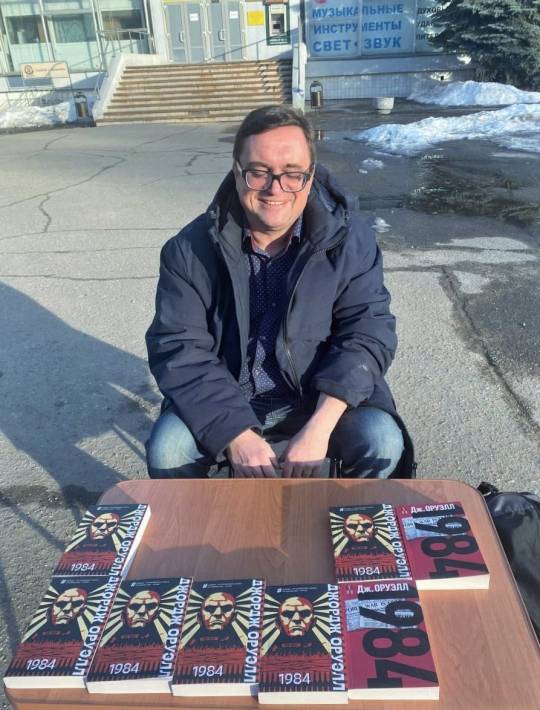
Dmitry Silin, who handed out George Orwell’s dystopia “1984” to passers-by, was charged with discrediting the Russian army.
159 notes
·
View notes
Text
So lemme get this right: when a quarter of French votes for a fascist candidate it's all cool and democracy at its finest but when right-wing parties in Ukraine poll at 2% which isn't even enough to get them into the parliament it means all Ukrainians are Nazis that deserve to be invaded
617 notes
·
View notes
Text
At a retirement home on the eastern edge of Berlin, half a dozen women in their 80s and 90s sit together having lunch. Their chatter is lively in the toasty-warm dining room.
The women are Ukrainian Holocaust survivors who fled the Nazis as children. Now, in old age, they had to go on the run again — this time from Russians.
Among the Ukrainians struggling to flee from Russian attacks, housebound senior citizens, often unable to get to shelters, are among the most vulnerable. Last month, Russian shelling killed 96-year-old Boris Romanchenko in his apartment in Kharkiv. In his youth, Romanchenko survived forced labor and four Nazi concentration camps.
One of those who has reached Germany is Sonya Leibovna Tartakovskaya, a retired seamstress from Irpin, near Kyiv. Today happens to be her 83rd birthday.
She once had family in this city. An older cousin, a student here in the 1930s, was murdered by the Nazis for being Jewish, as were many of her other relatives.
As the other women leave the lunch table for an afternoon nap, Tartakovskaya stays behind to talk with 90-year-old Alla Ilyinichna Sinelnikova, who has just arrived from Kharkiv.
"This war is a catastrophe. It's truly awful," Sinelnikova says in a whisper. "I never thought I would live to see such horror for the second time in my life. I thought it was in my past, all over and done with. And now we're reliving it."
Sinelnikova was nine when she fled Kharkiv the first time. Fearing Nazi persecution, she and her family were evacuated to Sverdlovsk in west-central Russia, where they saw out the war. She can't believe she had to come to Berlin to escape the Russians now — the very people who offered her refuge after the Germans invaded Ukraine in 1941.
"It is a strange paradox. I never believed the Russians would invade us," Sinelnikova says. "Half of my family are from Russia. How can I hate them? I can't, even if wanted to."
Rüdiger Mahlo, from Germany's Jewish Claims Conference, a nonprofit organization that helps Holocaust survivors, is coordinating the evacuation effort. Mahlo says it takes about 50 different people to evacuate just one older person from Ukraine. They often must be transported by ambulance.
Once they're in Germany, he says, these senior refugees need to be housed in care facilities where the staff speak Russian or Ukrainian. "Like in any war, the most weak people are the most vulnerable and Holocaust survivors belong to the most vulnerable people," he says. "For them, the situation is devastating."
Mahlo says some of Ukraine's Holocaust survivors refuse to set foot in Germany because of the past.
"You have the re-traumatization of the survivors," Mahlo says. "But we wanted them to feel safe and not to feel abandoned as they were in the beginning of their lives," when most Germans looked the other way and did nothing to protect Jews and other vulnerable people from Nazism.
As for Tartakovskaya, she says that if it weren't for the kindness of her neighbors, she'd be dead. They were the ones who alerted the JDC that she was in need.
"I lived alone, I have nobody. My whole family is long buried in cemeteries in different cities," she says. "But thanks to strangers, I got out of Irpin. My neighbors didn't leave me behind; they took me with them."
221 notes
·
View notes
Text
In fairness to the crew of the Moskva, being destroyed in a humiliating fashion by an enemy you wildly underestimated is in keeping with the highest traditions of the Russian navy
604 notes
·
View notes